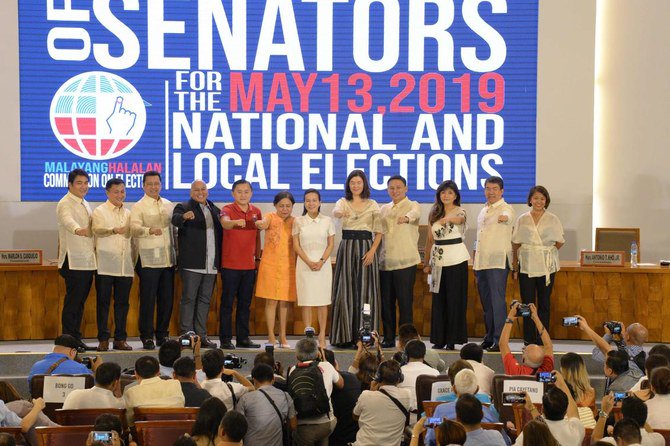Duterte allies dominate Philippine Senate race, shut out opposition

Philippines: The Philippine president’s allies won a majority of the 12 Senate seats at stake in the midterm elections, official results showed Wednesday, while the opposition’s shutout heralds a stronger grip on power by a leader accused of massive human rights violations.
Elections officials proclaimed the winners after finishing the official count of the May 13 elections overnight. The tally had been delayed by glitches in automated counting machines.
President Rodrigo Duterte backed eight winning aspirants to half of the seats in the 24-member Senate, including his former national police chief, Ronald dela Rosa, who enforced the president’s crackdown on illegal drugs in a campaign that left thousands of suspects dead and drew international condemnation.
Last week’s vote has been seen as a gauge of public support for Duterte, who is midway through the single six-year term Philippine presidents are allowed under the constitution. His anti-drug crackdown, unorthodox leadership style, combative and sexist joke-laden outbursts, and contentious embrace of China have been the hallmarks of his presidency.
“Do I look like a rubberstamp?” Senator-elect Bong Go, a longtime Duterte aide, replied when reporters asked him about concerns that the new Senate would be beholden to Duterte.
But he stressed he would back the president’s war against criminality, corruption and illegal drugs and would support a bill to reimpose the death penalty for heinous crimes and drug trafficking. Go said Duterte has not given any illegal orders to him or anyone he supervised.
Duterte’s three children also won races for mayor, vice mayor and a congressional seat representing their southern home region of Davao city. Voters also decided congressional, gubernatorial, mayoral and city and township races. Nearly 75 percent of more than 63 million registered Filipinos cast their votes in a strong turnout.
Analysts say many Filipinos seem more open to authoritarianism due to failures of past liberal leaders. Such a mindset has helped the family of the late dictator Ferdinand Marcos make a political comeback, the latest example being his daughter, Imee Marcos, one of the winning Senate candidates who was endorsed by Duterte.
The president has aimed for stronger leverage in the traditionally more independent Senate to bolster his legislative agenda. That includes the return of the death penalty, lowering the age for criminal liability below the current 15, and revising the 1987 constitution primarily to allow a shift to a federal form of government, a proposal some critics fear may be a cover to remove term limits.
During the campaign, Go said he felt Filipinos were not ready yet to support a shift to a federal form of government partly because of a lack of adequate information campaign about its benefits. “It’s a longshot and it’ll be difficult for us to work for the approval of federalism at this time,” Go said.
“My no. 1 agenda is the reimposition of the death penalty for drug trafficking,” dela Rosa said in a separate news conference, adding the drug menace remains troubling despite Duterte’s crackdown.
The handful of opposition senators whose seats were not up for election and the independents who won office last week could potentially offset the strong majority Duterte’s allies hold in the new upper chamber. At least seven senators are needed to block amendments to the constitution, which was passed with safeguards against dictatorship in 1987, a year after Marcos was ousted by an army-backed “people power” revolt.
Opposition aspirants, who were set back by a lack of funding and other campaign issues, considered the Senate the last bastion of checks and balances in the Philippine national government given the solid dominance of Duterte’s loyalists in the lower House of Representatives.
